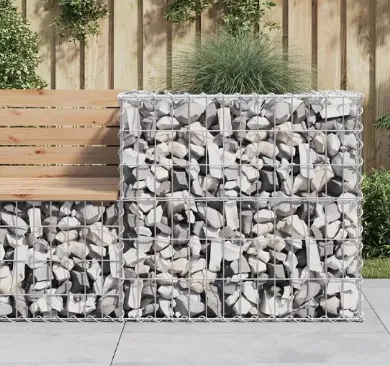Aug . 18, 2025 11:18 Back to list
Reinforce, Beautify, and Protect with the Ultimate Gabion Box Solutions
As infrastructure projects demand more sustainable, cost-effective, and resilient solutions, the gabion box is fast becoming the first choice across construction, landscaping, and environmental engineering. Merging functionality and form, this rock-filled wire mesh system is transforming everything from highway embankments to private garden walls, offering strength, adaptability, and eco-friendly design.

How Gabion Box Flexibility Handles Ground Deformation with Ease
One of the standout advantages of the gabion box is its unique structural flexibility. Traditional rigid retaining wall materials like concrete can crack under stress from soil movement. In contrast, the gabion box is composed of interlinked wire mesh cages that are filled with rocks, allowing it to deform and settle naturally along with the underlying soil without losing its integrity. This makes it ideal for regions prone to ground shifting or seismic activity.
The modularity of these systems also allows for tailored assembly across uneven terrain. Whether you’re sourcing a gabion box for sale for a large-scale civil engineering job or a smaller DIY landscape project, this flexibility ensures it can adapt without costly adjustments. This adaptability is particularly beneficial in mountainous regions or riverbanks, where natural erosion is a major concern. Over time, the gabion box becomes even more stable as vegetation grows through the mesh, binding it further to the ground.
The Ecological Edge: Environmental Benefits of Gabion Box Installations
What sets the gabion box apart in modern construction is its alignment with sustainable design principles. Unlike concrete walls that require extensive processing and release CO₂, rock baskets for retaining walls are constructed from galvanized steel and natural stones, reducing the carbon footprint from the outset. They are permeable by design, allowing water to pass through instead of building up pressure, which helps prevent erosion and soil degradation.
More impressively, gabion box walls create microhabitats for plants and small animals. Over time, these structures can become part of the local ecosystem, helping to restore natural balance in areas affected by human activity. This ecological compatibility has led to widespread use in environmentally-sensitive projects such as riverbank restorations, coastal defenses, and green infrastructure development. Whether looking at gabion box price for commercial procurement or a local project, the long-term environmental value justifies the investment.
Civil Engineering’s Silent Hero: The Role of Gabion Box in Infrastructure
In civil engineering, the gabion box serves multiple core functions beyond just holding soil. It is used extensively for stabilizing slopes, constructing retaining walls, protecting roadways, reinforcing bridge abutments, and even lining canals. Its porous structure prevents hydrostatic pressure buildup, one of the leading causes of structural failure in traditional retaining walls.
Furthermore, the open-cell design of a gabion box enables drainage without additional systems, minimizing construction time and costs. Because the materials are often locally sourced, including rocks and sometimes even recycled materials, this solution can be rapidly deployed with minimal environmental disruption.
In infrastructure development across varied climates and terrains, the gabion box performs exceptionally well under freeze-thaw cycles and water runoff—two of the most common threats to structural integrity in outdoor installations. Governments and contractors looking for gabion box for sale often factor in not just the initial cost, but the long-term durability and minimal maintenance.
Cost and Quality: What You Need to Know About Gabion Box Price
When evaluating gabion box price, it’s essential to consider both the initial expense and lifecycle value. Basic pricing is influenced by mesh type, wire coating (galvanized or PVC), size, and required customization. In general, gabion box systems are more economical than reinforced concrete alternatives, especially when accounting for labor, machinery, and long-term maintenance.
High-volume purchasers seeking gabion box for sale from verified manufacturers can often negotiate bulk discounts, especially when purchasing direct from suppliers. Buyers are encouraged to compare both mesh gauge and wire type to ensure the chosen gabion box meets project-specific durability needs. Weather-resistant coating enhances longevity, especially in wet or coastal environments.
Moreover, aesthetic appeal is increasingly becoming a selection criterion. With rock baskets for retaining walls now doubling as decorative features in landscaping projects, many customers are willing to invest slightly more for high-end stones or stainless steel finishes that elevate appearance without compromising function.
Gabion Box FAQs
What makes the gabion box more flexible than concrete walls?
Unlike rigid structures, the gabion box adapts to ground movement thanks to its modular wire mesh design. This flexibility makes it ideal for unstable soils, preventing cracks or collapse over time.
How eco-friendly is the gabion box in large-scale projects?
The gabion box is highly sustainable. It uses natural stones and recyclable materials, supports water drainage, and integrates into local ecosystems, making it a green solution for modern construction.
Why is gabion box price considered cost-effective?
The gabion box price is often lower than concrete or brick walls due to cheaper materials, faster installation, and reduced long-term maintenance, delivering outstanding value over time.
Are rock baskets for retaining walls suitable for residential landscaping?
Absolutely. Many homeowners use rock baskets for retaining walls to create tiered gardens, decorative fences, or erosion barriers. They combine strength, drainage, and visual appeal in outdoor spaces.
How do I select the best gabion box for sale for my project?
When browsing gabion box for sale, consider size, wire gauge, coating, and rock fill type. Also factor in environmental exposure and structural requirements to ensure lasting performance and aesthetics.
-
What is NATO Wire
NewsAug.18,2025
-
Why the Right PVC Horse Fence Matters More Than You Think
NewsAug.18,2025
-
Why Steel Grating Is Dominating Industrial Flooring and Safety Applications
NewsAug.18,2025
-
Why Reno Mattress Is Revolutionizing Slope Protection and Civil Engineering
NewsAug.18,2025
-
Why Reinforcing Trench Mesh Is the Backbone of Durable Foundations
NewsAug.18,2025
-
Why Galvanized Welded Wire Mesh Is the Backbone of Modern Construction
NewsAug.18,2025
products.







